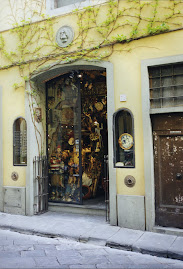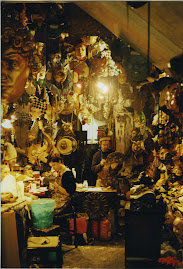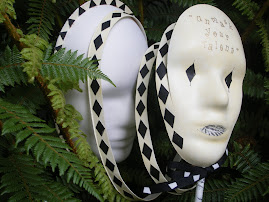"Given that we can live only a small part of what there is in us - what happens with the rest?"
Quote by Pascal Mercier
My mask making began with a visit to the Alice Atelier, Florence Italy, where I met Professor Agostino Dessi and daughter Alice and learned how to make a mask the traditional Italian way. “These are story containers” Agostino explains, “Stories are delicate, it’s best to store them in places that suit them. The stories a person can give to the world are precious”. Visit the Alice Atelier at http://www.alicemasks.com/
“Masks are made to liberate people’s hearts and minds” Agostino Dessi.
My mask making began with a visit to the Alice Atelier, Florence Italy, where I met Professor Agostino Dessi and daughter Alice and learned how to make a mask the traditional Italian way. “These are story containers” Agostino explains, “Stories are delicate, it’s best to store them in places that suit them. The stories a person can give to the world are precious”. Visit the Alice Atelier at http://www.alicemasks.com/
“Masks are made to liberate people’s hearts and minds” Agostino Dessi.
Saturday, August 22, 2009
Tuesday, June 9, 2009
Webbed Vision

This mask composition was inspired by a strong dream in which a spider appeared, weaver of fate and destiny. The mask is constructed from spider-eye beads, 3x on-the-round jigsaw pieces, and antique French silk. Charlyne says: "Love your latest work, delicate and ethereal. I admire how your work is always evolving, and thought provoking." Thanks darling Char...
Sunday, February 22, 2009
Visual Taste Composition
 This is a wee 'taste' of where my mask making is going. This mask is made out of meat, yes, rosy-pink proscuitto! I found the proscuitto to be an excellent moulding material. Sadly, i have had to take the "meat mask" out of the spare room where it was drying because it was getting a bit whiffy. Next i tried making a "sushi mask" from wet seaweed, which looked rather nice to begin with but as it dried it started to buckle and peel off the mould, so that one is a work-in-progress. You might be wondering what is the point of making masks out of edible kitchen materials and foodstuffs...it's the duo-challenge of using unusual materials artistically and finding beauty where you least expect it! Why make a sandwich when you can make a piece of mask art?
This is a wee 'taste' of where my mask making is going. This mask is made out of meat, yes, rosy-pink proscuitto! I found the proscuitto to be an excellent moulding material. Sadly, i have had to take the "meat mask" out of the spare room where it was drying because it was getting a bit whiffy. Next i tried making a "sushi mask" from wet seaweed, which looked rather nice to begin with but as it dried it started to buckle and peel off the mould, so that one is a work-in-progress. You might be wondering what is the point of making masks out of edible kitchen materials and foodstuffs...it's the duo-challenge of using unusual materials artistically and finding beauty where you least expect it! Why make a sandwich when you can make a piece of mask art?
Friday, July 25, 2008
TinkerBelle
Sunday, June 22, 2008
Dunedin Midwinter Carnival '08

 It is Winter Solstice here in Dunedin and time to celebrate the shortest day/longest night with our annual Midwinter Carnival where hundreds of lantern-bearers, young and old, take to the streets with hand crafted, candlelit paper lanterns. This year's theme was New Zealand birds so huge papery tuis, albatross, fantail, owls featured in the pagaent. Seven masked dancers looked enchanting with their whitened hair, faces and "winter sprite masks". An extravagant fireworks show sent sparks raining down on the rapt crowd and the paper firebird lanterns. Conditions couldn't have been better with the weather mild and the night crisp, clear and windless, quite a contrast to last year when the event had to be cancelled due to a wild snowstorm. Note: The figure in the white mask holding the Owl Lantern is moi!!
It is Winter Solstice here in Dunedin and time to celebrate the shortest day/longest night with our annual Midwinter Carnival where hundreds of lantern-bearers, young and old, take to the streets with hand crafted, candlelit paper lanterns. This year's theme was New Zealand birds so huge papery tuis, albatross, fantail, owls featured in the pagaent. Seven masked dancers looked enchanting with their whitened hair, faces and "winter sprite masks". An extravagant fireworks show sent sparks raining down on the rapt crowd and the paper firebird lanterns. Conditions couldn't have been better with the weather mild and the night crisp, clear and windless, quite a contrast to last year when the event had to be cancelled due to a wild snowstorm. Note: The figure in the white mask holding the Owl Lantern is moi!!Wednesday, May 21, 2008
Ochre Eyes: Pamela Croft Response Exhibition Australia

Typically the Aboriginal artist adopts a viewpoint which elevates the mind’s eye to a broader panoramic view - a bird’s eye view approach called “spirit perspective”. Such an aerial view involves a marvelous look; a look that does not take but receives in the mansion of the mind…the only sustainable viewpoint.
In response to Dr. Pamela Croft’s textured visual narrative workshop at TAFTA, Brisbane, June 2007, this artwork features two masks. The two masks are about differing perspectives or viewpoints (both ways of seeing). The “ochre eyes” mask represents the indigenous “spirit perspective”, while the white “exploded”* mask represents the disintegrating power of the white (Western) gaze.
*The white mask ‘exploded’ during its hot pressed paper moulding process and so, rather than discard it because of its imperfection, I used it as it was. The words "Finally, like broken eggshell, the face of white mischief cracks...and falls away" were later added around the rim.
After a lifetime of looking at things solely through a white Western perspective your eyes get lost. Making this textured visual narrative was an eye-quest to find my way home. This 12 x 12 Composition in Mask is created from two Multimasks (premoulded recycled paper base masks), ethically-sourced Australian ochre, shoe polish, acrylic paints, recycled sari silk, stretched canvas frame, ripped brochure “Broken Links: the Stolen Generations in Queensland” decoupage.
In response to Dr. Pamela Croft’s textured visual narrative workshop at TAFTA, Brisbane, June 2007, this artwork features two masks. The two masks are about differing perspectives or viewpoints (both ways of seeing). The “ochre eyes” mask represents the indigenous “spirit perspective”, while the white “exploded”* mask represents the disintegrating power of the white (Western) gaze.
*The white mask ‘exploded’ during its hot pressed paper moulding process and so, rather than discard it because of its imperfection, I used it as it was. The words "Finally, like broken eggshell, the face of white mischief cracks...and falls away" were later added around the rim.
After a lifetime of looking at things solely through a white Western perspective your eyes get lost. Making this textured visual narrative was an eye-quest to find my way home. This 12 x 12 Composition in Mask is created from two Multimasks (premoulded recycled paper base masks), ethically-sourced Australian ochre, shoe polish, acrylic paints, recycled sari silk, stretched canvas frame, ripped brochure “Broken Links: the Stolen Generations in Queensland” decoupage.
Sunday, February 3, 2008
Rose Monday
 Rose Monday 4th February '08 (which precedes Shrove Tuesday) is marked by huge masked parades in the cities of Cologne, Dusseldorf and Mainz when these carnival centres are crowded with visitors. Musicians in costume, dance troupes, huge floats manifesting political satire, jesters, false noses, confetti, fancy hats, dress-ups and rose-throwing mean it must be Rose Monday in Germany.
Rose Monday 4th February '08 (which precedes Shrove Tuesday) is marked by huge masked parades in the cities of Cologne, Dusseldorf and Mainz when these carnival centres are crowded with visitors. Musicians in costume, dance troupes, huge floats manifesting political satire, jesters, false noses, confetti, fancy hats, dress-ups and rose-throwing mean it must be Rose Monday in Germany.Rose Monday festivities began in the early 19th century and have become an annual fixture. Rose Monday is the highlight of the carnival period - sometimes called "the fifth season" - which began its preparations on the 11th November '07 right up until Ash Wednesday (6th February '08) on which day Lent begins and lasts until Easter.
Subscribe to:
Comments (Atom)





